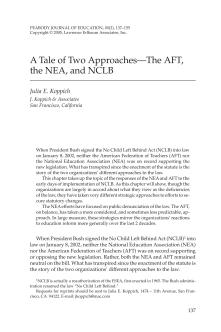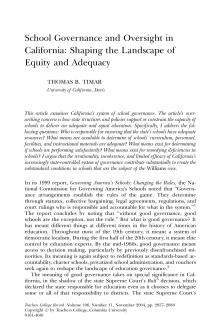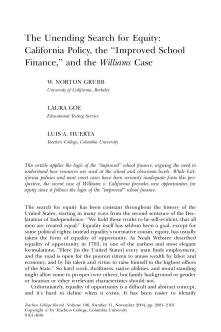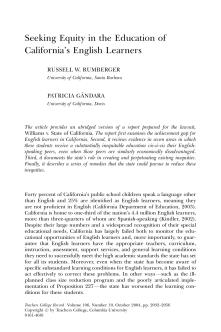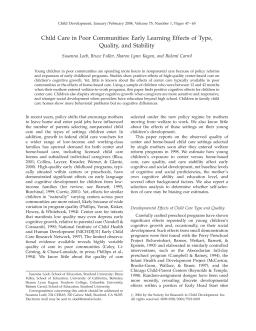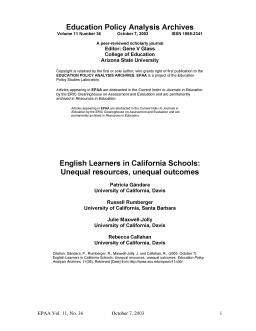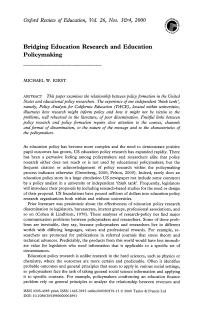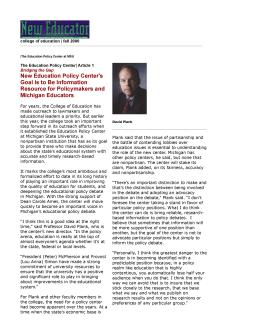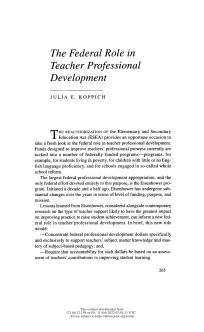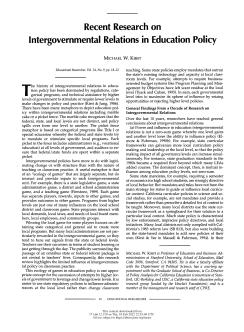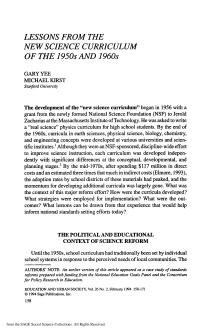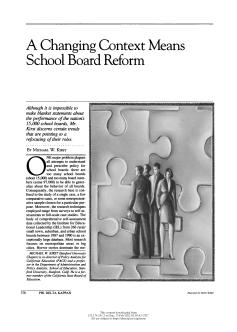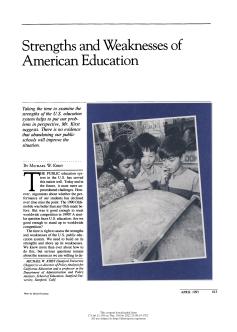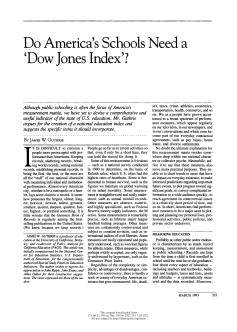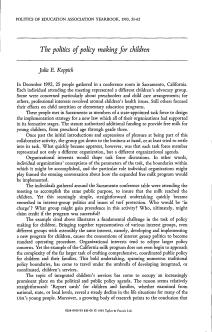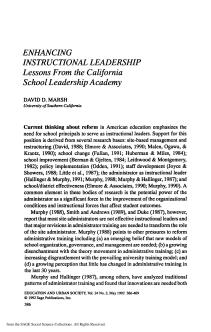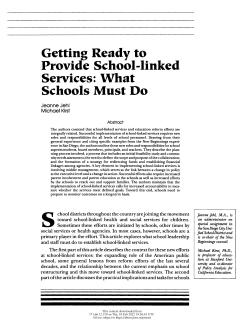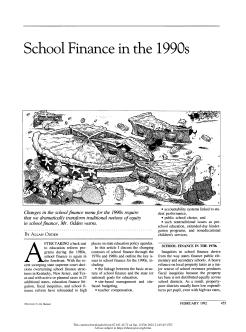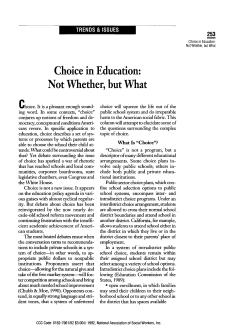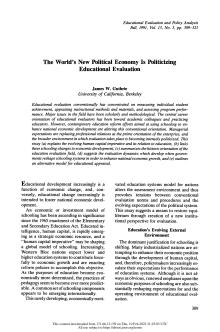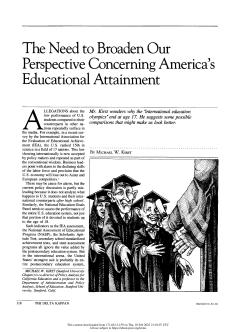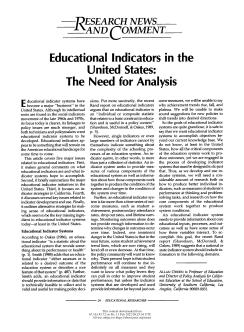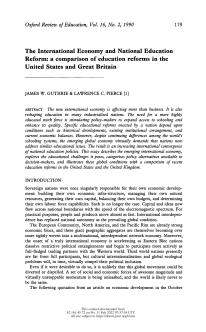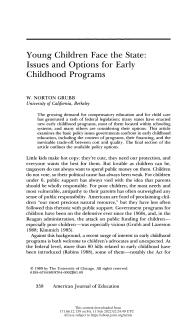Published
Summary
The National Education Association (NEA) and the American Federation of Teachers (AFT) initially remained neutral on the No Child Left Behind Act (NCLB). Though both organizations have similar criticisms of the law, the AFT has taken a more thoughtful and less predictable approach, while the NEA has focused on public denunciation. However, neither organization has been entirely successful in crafting a policy response to NCLB.
Shaping the Landscape of Equity and Adequacy
Published
Summary
This report focuses on California's school governance system and how it affects schools' ability to provide an adequate and equal education. The author examines who is responsible for ensuring adequate resources, how to assess adequacy, how to determine school performance, and how to address deficiencies. The report argues that California's state-controlled governance system is irrational, incoherent, and limited in efficacy, contributing to substandard school conditions, as seen in the Williams v. California case.
California Policy, the "Improved School Finance," and the Williams Case
Published
Summary
This article applies the logic of the ‘‘improved’’ school finance, arguing the need to understand how resources are used at the school and classroom levels. While California policies and most court cases have been seriously inadequate from this perspective, the recent case of Williams v. California provides new opportunities for equity since it follows the logic of the ‘‘improved’’ school finance.
Published
Summary
This article presents a summary of a report prepared for the Williams v. State of California lawsuit, highlighting the achievement gap for English learners in California and seven areas where they receive an inequitable education compared to their English-speaking peers. It also documents the state's role in perpetuating these inequities and proposes remedies to reduce them.
Early Learning Effects of Type, Quality, and Stability
Published
Summary
This report examines the effects of center care and home-based care on cognitive and social development of young children in poor communities, as well as the impact of caregiver sensitivity and education level. The study used a sample of children whose mothers entered welfare-to-work programs and found positive cognitive effects for children in center care, and stronger cognitive and social development for those with more sensitive and educated caregivers. However, children in family child care homes showed more behavioral problems.
Published
Summary
Modern statecraft in education is giving way to unmodern policy and institutional reform, favoring small and communal schools, alternative networks, and cultural pluralism. Charter schools and preschooling illuminate this shift toward de-centering education, while posing the long-term challenge of balancing particular forms of schooling against the modern impulse to integrate groups via large institutions.
Unequal Resources, Unequal Outcomes
Published
Summary
This article discusses the inequitable education provided to English language learners in California, arguing that there are seven areas where these students receive an inferior education compared to English speakers. That includes having less qualified teachers, inferior curriculum, and being assessed with invalid instruments. The article provides suggestions for addressing these issues.
Published
Summary
This paper examines the relationship between policy formation in the United States and educational policy researchers. The experience of one independent 'think tank', namely PACE, located within universities, illustrates how research might inform policy and how it might not be victim to the problems, well rehearsed in the literature, of poor dissemination. Fruitful links between policy research and policy formation require close attention to the sources, channels, and format of dissemination, to the nature of the message, and to the characteristics of the policymakers.
New Education Policy Center's Goal Is to Be Information Resource for Policymakers and Michigan Educators
Published
Summary
Michigan State University's College of Education has established the nonpartisan Education Policy Center to provide lawmakers and educational leaders with accurate, research-based information to improve the state's educational system. With the support of the university's resources, the center aims to play an important role in deepening the policy debate and bringing about improvements in the system. The center was established due to a lack of systematic communication between researchers and policymakers in Michigan.
Published
Summary
The reauthorization of the Elementary and Secondary Education Act provides an opportunity to reconsider the federal role in teacher professional development. The largest federal professional development fund is the Eisenhower program. Lessons from Eisenhower and contemporary research suggest that federal funds should be focused exclusively on subject matter knowledge and pedagogy and accountability should be based on assessment of student learning. The purpose is to generate discussion on how to more effectively use federal dollars to improve student achievement.
Published
Summary
Intergovernmental relations in education policy are dominated by regulations, programs, and technical assistance. A metaphor called "ecology of games" captures how each level of government maximizes its influence, affecting state and local policy-making. Classroom practice is limitedly influenced by intergovernmental policy, as local demands, taxes, and needs also play a role. State policies are easier to influence administrators than to change teaching. Each level of government tries to maximize its sphere of influence.
Published
Summary
The National Science Foundation granted MIT's Jerold Zacharias in 1956 to develop a real science physics curriculum for high school students. By the 1970s, curricula were developed in various sciences, but each independently with differences in development, planning, and concepts. Despite the $117 million cost, adoption rates peaked and momentum for further curricula development waned. Lessons can be drawn from this experience to inform national standards today.
Published
Summary
The research base for understanding and prescribing policy for school boards is limited due to the large number of boards and members. Common school boards, especially those of small districts, are less researched. To address this, overall trends affecting most boards should be analyzed to determine the need for and direction of school board reform. Waiting for representative data on all boards will delay improvements to policy making. Major changes in school board roles, functions, and operations are necessary due to the interaction of these trends.
Published
Summary
The US public education system has served the nation well, but it must now face unprecedented challenges and worldwide competition. The strengths and weaknesses of the system need to be assessed to build on its strengths and address its weaknesses. However, questions remain about the resources and political will necessary to get the job done.
Published
Summary
The article discusses the importance of parent involvement in education and its effects on student achievement. It suggests that schools need to create a welcoming environment for parents and engage them in meaningful ways, such as through volunteering and decision-making committees. Additionally, the article emphasizes the need for schools to provide information and resources to parents, especially those who are disadvantaged, to ensure that they are equipped to support their children's learning at home.
Published
Summary
The politics of policy making for children is complex due to the multiple interest groups involved. Fragmented policies exacerbate the problem of declining life situations for children. A comprehensive children's policy is needed, but traditional interest-group approaches to policy development must shift to integrate services for children. California's politics of children's policy is briefly explored. The current political paradigm must fundamentally change to open policy doors for broad-based integrated services for children.
Lessons from the California School Leadership Academy
Published
Summary
American education reform stresses the importance of principals as instructional leaders, but most are not effective in this role. Research suggests that innovative administrator training is needed to transform the role of site administrators. Content and process criteria have been identified, and several state-sponsored training programs have been established to meet them. One such program is the California School Leadership Academy, which provides a three-year program for aspiring and practicing site administrators with an emphasis on instructional leadership.
What Schools Must Do
Published
Summary
This article contends that school-linked services and education reform efforts are integrally related. Successful implementation of school-linked services requires new roles and responsibilities for all levels of school personnel. Drawing on general experience and citing specific examples from the New Beginnings experience in San Diego, the article outlines these new roles and responsibilities for school superintendents, board members, principals, and teachers. It describes the planning process involved, a process that includes an initial feasibility study and community needs assessment; a...
Published
Summary
School finance has become a prominent issue again due to court decisions and litigation in several states. This article explores school finance changes in the 70s and 80s and outlines key issues for the 90s, including the relationship between finance and education goals, site-based management, teacher pay, accountability, school choice, and nontraditional issues such as preschool and non-educational services for children.
Not Whether, But What
Published
Summary
Debate over school choice has been reignited due to the school reform movement and frustration with low academic achievement. The conversation becomes heated when private schools are included in the system of choice, as proponents believe it will foster competition and improve schools, while opponents argue it will harm public schools and society. This article aims to shed light on the complex issue of school choice.
Published
Summary
Traditionally, educational evaluation has focused on measuring student achievement and program performance. However, education reforms are now linking schooling to economic development, leading to a shift towards managerial expectations and politicization of the field. This article explains the human capital imperative and its relation to education, summarizes the history of educational evaluation, and outlines an alternative model for educational appraisal in the context of government-led education system reforms aimed at enhancing national economic growth.
Published
Summary
The U.S. ranks low in international education comparisons, but the discussion is misleading because it does not look at postsecondary education. The value added by the postsecondary education system, including community colleges, trade schools, and universities, is ignored. The U.S.'s strongest suit is probably its entire postsecondary education system in the international arena.
The Need for Analysis
Published
Summary
Educational indicator systems are in demand in the US due to their strong linkages to policy issues. This article covers five major issues related to educational indicators, including what they are, major initiatives in the US, and indicator strategies in California. It also discusses key issues related to indicator development and use and outlines alternative strategies for making sense of educational indicators, which are currently missing in the US.
A Comparison of Education Reforms in the United States and Great Britain
Published
Summary
The new global economy is reshaping education worldwide, necessitating policies that expand access and enhance quality. Despite different educational systems, similar issues need to be addressed, resulting in an international convergence of education policies. The article discusses the emerging economy, educational challenges, policy alternatives, and compares recent reforms in the US and UK.
Issues and Options for Early Childhood Programs
Published
Summary
The growing demand for compensatory education and for child care has generated a rash of federal legislation; many states have enacted new early childhood programs, most of them located within schooling systems, and many others are considering their options. This article examines the basic policy issues governments confront in early childhood education, including the content of programs, their financing, and the inevitable trade-off between cost and quality. The final section of the article outlines the available policy options.
